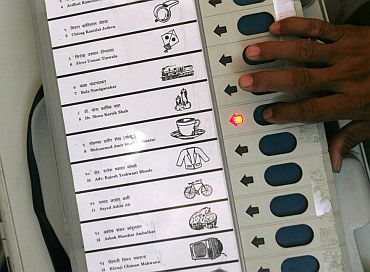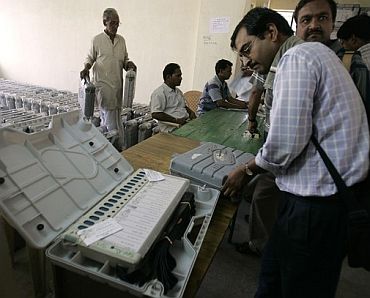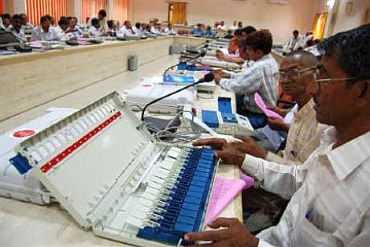 | « Back to article | Print this article |
'Electronic Voting Machines are not tamper-proof!'
A group of IT experts from US have claimed that the Indian EVMs are not tamper-proof and asked the Election Commission to explore other forms of voting that provide "transparency" and security.
The academicians and experts wrote the letter within days of a heated debate between IT experts and officials from ECI regarding the machines.
"Although India's EVMs have a simple design that avoids many of the problems found in other direct-recording electronic (DRE) voting machines, they are still vulnerable to a wide range of attacks," the academicians and IT experts said in the letter.
"New classes of attacks have been discovered since the time the EVMs were introduced that render many of their security assumptions obsolete. Therefore, we conclude, after listening to the arguments of the panelists, that India's EVMs do not today provide security, verifiability, or transparency adequate for confidence in election results," it said. Click on NEXT to read further...
'Electronic Voting Machines are not tamper-proof!'
Among signatories to the letter are Prof Ben Adida (Harvard University), Dr Josh Benaloh (Microsoft Research), Prof Matt Blaze (University of Pennsylvania), Bill Cheswick (AT&T Shannon Labs), Prof Russell A Fink (University of Maryland, Baltimore County), Prof Ian Goldberg (University of Waterloo), Dr Joseph Lorenzo Hall (University of California, Berkeley/Princeton University / ACCURATE), Harri Hursti (CTO, Clear Ballot Group), and Neal McBurnett (Election Audits).
"As experts in electronic voting technology and computer security, we have significant concerns about the security, verifiability, and transparency of India's EVMs," they wrote after attending an industry conference on this issue in Washington on Monday.
"We urge the Election Commission to explore other forms of voting that are suitable to the Indian context and that do provide adequate transparency, verifiability, and security," they said.
'Electronic Voting Machines are not tamper-proof!'
Other democracies have adopted and then abandoned DRE voting as science's understanding of election security has progressed.
"Our research community has been involved in this process around the world, and you are welcome to draw on our collective experience and expertise as you see fit," the experts wrote.
However, at the industry conference organised by USENIX, Alok Shukla, Deputy Election Commissioner and P V Indiresan, former director of the Indian Institute of Technology, Madras, and Chairman of the Expert Committee, argued that "Indian EVMs are fully tamper-proof when used under complete administrative safeguards prescribed by the ECI."
"There is no justification in the demand for a change in the voting system," he said.
'Electronic Voting Machines are not tamper-proof!'
Both Shukla and Indiresan conceded that there is scope for improvement in the machine and the technology and the ECI has been doing this as and when any discrepancy is brought to its notice.
Though the EVMs are low in technology, they argued that EVNs have no operating system, could not be networked and no input was possible except from the ballot unit of the machine.
Shukla refuted allegations that EVMs had been corrupted with a Trojan programme, Indiresan said that the claims regarding EVM vulnerability were exaggerated, especially given the machines' new security features.
But there were few takers of the arguments made by Shukla and Indiresan at the seminar, which was mostly dominated by industry experts, technocrats and academicians.



